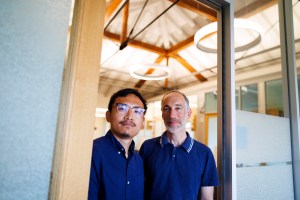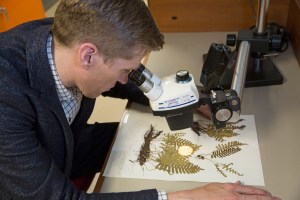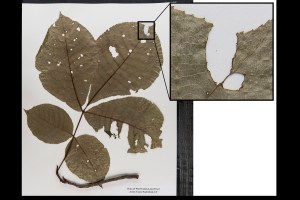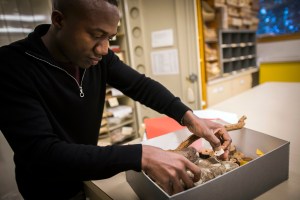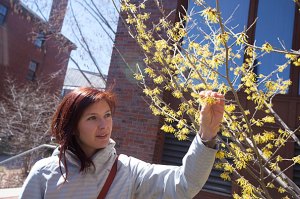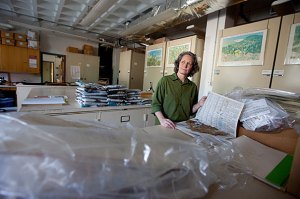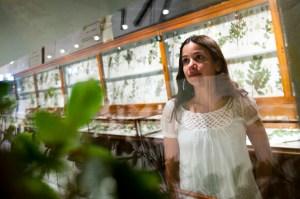Tag: Plants
-
Science & Tech
From a plant-free place, clues about how to help plants survive as planet warms
Data from salt flats suggest dry soil is worse than rising temperature

-
Science & Tech
Getting to root of possible carbon storage changes due to climate change
New study looks at the dynamics of how warming may affect carbon capture in soil near trees and plants.
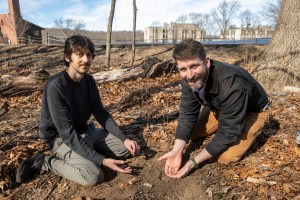
-
Health
Why weeping willows bend and poison ivy doesn’t
A mathematical framework can explain how a plant stem’s “sense of self” contributes to its growth upward or downward.
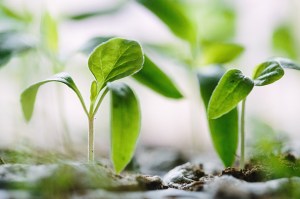
-
Science & Tech
The era of climate responsibility
At Harvard’s 10th annual Plant Biology Symposium, climate expert Chris Field talked about the need to evaluate environmental risks in the coming decades even as many people work to reduce climate-warming emissions.
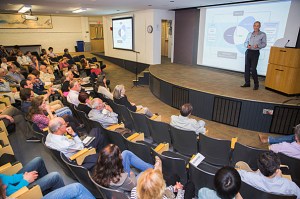
-
Health
Stages of bloom
Harvard researchers have solved the nearly 200-year-old mystery of how Rafflesia, the largest flowering plants in the world, develop.
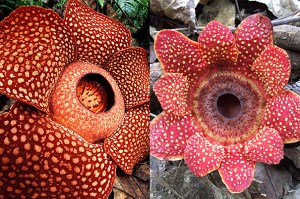
-
Health
Plant power
The world we live in was made possible by the precursors to plants, which crossed two evolutionary hurdles that transformed not only plant life, but also the Earth’s atmosphere and its once-barren continents, Arnold Arboretum Director William Friedman said in a recent lecture.
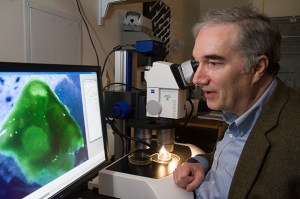
-
Health
Actually, the star’s a turkey
Visiting Professor Pamela Diggle took listeners into the botanical roots of Thanksgiving dinner, illustrating how nature’s everyday trials forced plants to come up with unusual — and delicious — ways to survive.
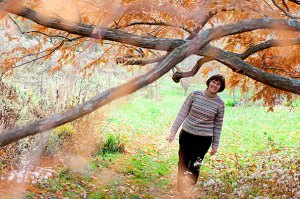
-
Campus & Community
Planting a research center in the arboretum
With the opening of the Weld Hill facility at Arnold Arboretum, staff members and lab equipment are filling the long-awaited space dedicated to botanical research.

-
Campus & Community
E.O. Wilson to lecture, co-host conservation benefit dinner
E.O. Wilson will host a lecture and dinner with biologist Daniel H. Janzen on Oct. 1 to benefit Area de Conservación Guanacaste, 163,000 hectares of tropical treasure in northwestern Costa Rica.
-
Health
Hey squash, time for your close-up
Bruce Smith, of the Smithsonian National Museum of Natural History, discusses the rise of agriculture in a talk at the Harvard Museum of Natural History.
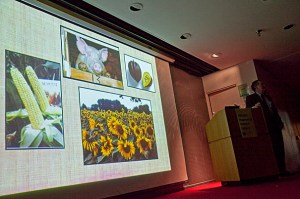
-
Science & Tech
When success spells defeat
Invasive plants are beneficiaries of climate change in Thoreau’s woods.
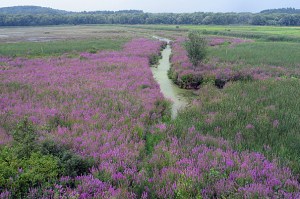
-
Science & Tech
Nectar nurtures pitcher plant’s eating habits
New research from the Harvard Forest shows that carnivorous pitcher plants use sweet nectar to attract ants and flies to their water-filled traps, not color, as earlier research had indicated.
-
Campus & Community
Organic brew puts green back into Yard
Earth Week is a good time to celebrate earth itself — the planet’s loose covering of fine-ground ancient rock we call soil.
-
Science & Tech
Modeling the forest … and the trees
When building computer models of the ecosystems that cover the earth’s surface, it is tempting to incorporate sweeping generalizations in your calculations.
-
Science & Tech
Scientists explore nature’s designs
As a graduate student, Harvard physical chemist Joanna Aizenberg acquired a passionate curiosity about — of all things — sponges. She particularly liked the ones made of glass, whose apparent fragility belied the fact that they could withstand terrific pressure in the deep sea.
-
Campus & Community
Effects of climate change vary greatly across plant families
Drawing on records dating back to the journals of Henry David Thoreau, scientists at Harvard University have found that different plant families near Walden Pond in Concord, Mass., have borne the effects of climate change in strikingly different ways. Some of the plant families hit hardest by global warming have included beloved species like lilies,…
-
Campus & Community
Fall commences motley fete
If “April is the cruellest month,” as T.S. Eliot wrote in his poem “The Wasteland” — then November is certainly the most marvelous. Judging from the glorious display of fall foliage in a Harvard Yard stimulated by chill breezes and hosting a thousand squirrels, this year’s turning leaves are a short-lived sight to behold.
-
Health
New Guinea forest expands ‘observatory’
Just getting there takes hours of hot, sweaty hiking through lowland Papua New Guinea forests: three hours from the road to the base camp, then another seven to the site. That’s when the real work begins: tagging, measuring, and identifying 250,000 trees scattered over 50 hectares.
-
Health
Global ‘chump change’ could provide biodiversity protection
Harvard biologist Edward O. Wilson said the Earth’s major biological hot spots could be conserved for roughly $50 billion— an amount he termed “chump change” in a world of trillion-dollar financial bailouts.
-
Campus & Community
The pine beetle’s tale: Destructive insect has pharmaceutical potential
Researchers at Harvard Medical School and the University of Wisconsin, Madison, have discovered how beetles and bacteria form a symbiotic and mutualistic relationship — one that ultimately results in the destruction of pine forests. In addition, they’ve identified the specific molecule that drives this whole phenomenon.
-
Health
Harvard Forest: 3,500 acres, global impact
Harvard may be rooted in Cambridge, but it has a lot more roots in the small north-central Massachusetts town of Petersham. That’s where you’ll find the woods, streams, and fields of the Harvard Forest, a 3,500-acre research and teaching facility that’s been part of the University for more than a century. Having been closely monitored…
-
Campus & Community
Arnold Arboretum launches SHIP initiative
Today (April 10) the Arnold Arboretum launched the online component of its SHIP (Seed Herbarium Image Project) initiative, which utilizes high-resolution digital photography to document the morphology of seeds and associated fruit structures. The culmination of more than two years of planning and preparation, the project is a unique digital resource for scientists, horticulturists, and…
-
Health
Bonsai collection highlights age, beauty
The foliage is green and youthful, but the twisted, gnarled trunks show the trees’ age. But that’s the point, of course.


